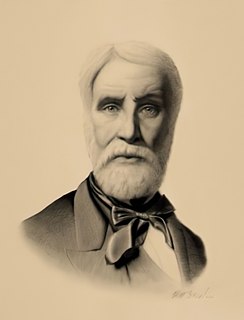A Quote by Edmund Burke
The moment you abate anything from the full rights of men to each govern himself, and suffer any artificial positive limitation upon those rights, from that moment the whole organization of government becomes a consideration of convenience.
Related Quotes
I believe all Americans are born with certain inalienable rights. As a child of God, I believe my rights are not derived from the constitution. My rights are not derived from any government. My rights are not denied by any majority. My rights are because I exist. They were given to me and each of my fellow citizens by our creator, and they represent the essence of human dignity.
Human rights' are a fine thing, but how can we make ourselves sure that our rights do not expand at the expense of the rights of others. A society with unlimited rights is incapable of standing to adversity. If we do not wish to be ruled by a coercive authority, then each of us must rein himself in...A stable society is achieved not by balancing opposing forces but by conscious self-limitation: by the principle that we are always duty-bound to defer to the sense of moral justice.
In short, it is the greatest absurdity to suppose it in the power of one, or any number of men, at the entering into society, to renounce their essential natural rights, or the means of preserving those rights; when the grand end of civil government, from the very nature of its institution, is for the support, protection, and defence of those very rights; the principal of which, as is before observed, are Life, Liberty, and Property.
There's this big debate that goes on in America about what rights are: Civil rights, human rights, what they are? it's an artificial debate. Because everybody has rights. Everybody has rights - I don't care who you are, what you do, where you come from, how you were born, what your race or creed or color is. You have rights. Everybody's got rights.
I typically don't use the distinction 'positive' and 'negative' liberty, because negative sounds bad and positive sounds good, and I don't think that the terminology ought to prejudice us one way or the other. So I think the more descriptive term is 'liberty rights' versus 'welfare rights'. So, liberty rights are freedom-of-action type rights, and welfare rights are rights-to-stuff, of various kinds...And, property rights are not rights-to-stuff. I think that's one of the key misunderstandings about property. Property rights are the rights to liberty within your jurisdiction.
So what's the difference between republican and democratic forms of government? John Adams captured the essence of the difference when he said, 'You have rights antecedent to all earthly governments; rights that cannot be repealed or restrained by human laws; rights derived from the Great Legislator of the Universe.' Nothing in our Constitution suggests that government is a grantor of rights. Instead, government is a protector of rights.
First there is the democratic idea: that all men are endowed by their creator with certain natural rights; that these rights are alienable only by the possessor thereof; that they are equal in men; that government is to organize these natural, unalienable and equal rights into institutions designed for the good of the governed, and therefore government is to be of all the people, by all the people, and for all the people. Here government is development, not exploitation.
It is not the business of government to make men virtuous or religious, or to preserve the fool from the consequences of his own folly. Government should be repressive no further than is necessary to secure liberty by protecting the equal rights of each from aggression on the part of others, and the moment governmental prohibitions extend beyond this line they are in danger of defeating the very ends they are intended to serve.
The last point for consideration is the supposed disposition of the people to interfere with the rights of property. So essential does it appear to me, to the cause of good government, that the rights of property should be held sacred, that I would agree to deprive those of the elective franchise against whom it could justly be alleged that they considered it their interest to invade them.











































